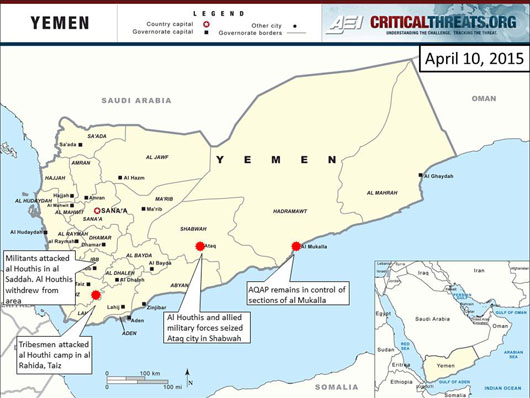The al Houthis and allied military forces seized the capital of Shabwah in eastern Yemen, the farthest east the al Houthis have advanced in the current conflict. The al Houthis may face difficulties in establishing a foothold in Shabwah, where they will likely not have widespread local support.
The al Houthis and allied military forces advance into Yemen’s eastern Shabwah governorate. Al Houthis and allied military forces seized Ataq, the capital of Shabwah, southeastern Yemen, on April 9. Shabwah is home to Awalek tribes, from which some prominent al Qaeda in the Arabian Peninsula (AQAP) members have come. Local tribal leaders and security officials aided the al Houthis’ entrance into the city, which is 100 miles north of Yemen’s largest liquid natural gas plant at Belhaf. Operation Decisive Storm fighter jets bombed Shabwah airport on April 9 in response to the al Houthis’ advance.
Islamic militants fight al Houthis in Ibb while AQAP remains in control of al Mukalla, Hadramawt. Militants attacked al Saddah in central Ibb on April 9. Local residents claimed that the al Houthis who had been in control of the area retreated and that militants raised al Qaeda’s flag over local government buildings. Initial reports indicated the militants belonged to AQAP’s insurgent arm, Ansar al Sharia, and that AQAP spiritual leader Mamoun Hatem led them. Unofficial pro-Islamic State in Iraq and al Sham (ISIS) Twitter accounts claimed, however, that ISIS fighters were responsible for the attack. Hatem, notably, has made pro-ISIS statements previously. Al Saddah tribes are denying that militants currently control the town and stated the tribes currently control al Saddah. Separately, Ansar al Sharia militants remain in control of part of al Mukalla, the capital of Hadramawt, and prevented a demonstration against their control on April 9.
Iran’s Supreme Leader strongly denounced Operation Decisive Storm. Iran’s Supreme Leader Ayatollah Ali Khamenei condemned the Saudi-led Operation Decisive Storm in Yemen as a “genocide” and “crime.” U.S. Secretary of State John Kerry in an April 8 interview stated that the U.S. is aware of Iranian support for the al Houthis and warned against Iranian activity in Yemen. Separately, Pakistan’s parliament voted unanimously to remain neutral in the current Yemen conflict. Saudi Arabia had asked for Pakistan to provide military support to Operation Decisive Storm.
UN Security Council to vote on further sanctions on al Houthi leadership and former Yemeni President Ali Abdullah Saleh’s family. The UN Security Council is set to vote on April 10 on a resolution drafted by Jordan and Gulf Arab States imposing a global asset freeze and travel ban on al Houthi leader Abdul Malik al Houthi and Saleh’s son, Ahmed Ali Abdullah Saleh. Al Houthi military leadership and Saleh are already sanctioned. The resolution would also impose an arms embargo on the al Houthi leadership. It is unclear how Russia would vote on the resolution. Russian diplomats indicated that an arms embargo should also be placed on the government of Abdu Rabbu Mansour Hadi.
Ongoing operations against the al Houthis continue to distract from the fight against AQAP and newly emerging ISIS cells. Both groups will likely take advantage of the current security vacuum to expand and increase operations. The Yemeni military remains fractured and will likely not be able to prevent AQAP from expanding in eastern governorates.

